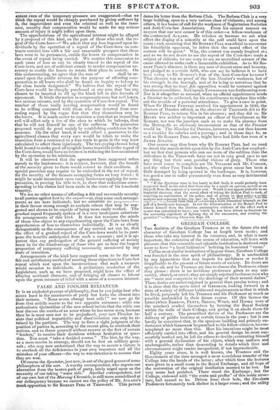FALSE AND FOOLISH RELIANCES.
IT is an exploded precept of philosophy, that he can judge best who mixes least in the manceuvres of party but looks the closest into their actions. " Nous avons change tout cela I" we now go far from that middle course to the two opposite extremes : while one enthusiastic Quinctilian of the new school insists that the critic can best discuss the merits of an actor whom he has never seen, because then he is most sure not to be prejudiced, your new Phocion in- sists that political impartiality and discrimination can only be at- tained by the partisan. The way to form a right judgment of the position of parties is, according to the recent plan, to overlook their actions, and to throw yourself without reserve at the feet of certain "leaders," to receive their decisions without hesitation or ques- tion. You must "take a decided course." The hint, by the way, as a mere maxim in strategy, should not be lost on military gene- rals; who may now understand that the way to secure a victory is to overlook all the deficiencies in your own resources and all the mistakes of your officers—the way to win victories is to assume that they are won. Of course the Spectator, just now' is out of the good graces of some philosophers of the sort. A worthy correspondent, who regrets our aberration from the beaten path of party, lately urged upon us the necessity of our taking "some side.' Another correspondent, not of our own but of the Morning Chronicle, is still more scandalized at our delinquency because we cannot see the policy of Mr. ACLAND'S MBEk opposition to Sir ROBERT PEEL at Tamworth. This person dates his letter from the Reform Club. The Reform Club is a very large building, open to a very various class of visitants; and among others, it is a house of call for the workmen of Registration Societiea and Anti-Corn-law Associations. From his earnest manner we suspect that our new censor is of this order—a fellow-workman of the contemned ACLAND. He rebukes us because we ask what effect the display of a minority at the poll could have upon the cause ; and, assuming that Sir ROBERT PEEL was afraid to encounter his formidable opponent, he infers that the moral effect of the contest will be great.* Why, the contest was merely laughed at ; and as we do not desire to see the repeal of the Corn-laws made a subject of ridicule, we are sorry to see an accredited servant of the cause allowed to make such a lamentable exhibition. As to Sir Ro. BERT PEEL'S absence, is there any man of decent sense and honesty, not pledged to a certain faith, who can say he believes it to have been owing to Sir. ROBERT'S fear of the Anti-Corn-law lecturer ? That absence was no proof of the late Member's weakness, but of his strength in the borough, and of its being so notorious that he was strong that no howl fide opposition would be ventured against the absent candidate. No Captain TOWNSHEND was forthcoming now. Nor is it altogether so unusual, when an official appointment sends a Member to be reelected, for his constituents to replace him with- out the trouble of a personal attendance. To give a case in point. When Sir HENRY PARNELL received his appointment in 1835, the electors of Dundee offered, as the electors of Tamworth did to Sir ROBERT PEEL, to return him in his absence ; and they did so. Sir Hxxar was neither so important an officer of Government as Sir ROBERT, nor was the juncture such as to make his absence from the Metropolis so obviously inconvenient as that of the Premier would be. The Member for Dundee, however, was not then known as a truckler for salaries and a peerage ; and in those days lie, as well as Sir ROBERT PEEL now, might have had little fear even of a JAMES ACLAND.
Our censor may thus learn why Sir ROBERT PEEL had no need to dread the march stolen upon him by the Anti-Corn-law employe : but we fear that persons who can see more of the sublime than the ridiculous in the Tamworth farce are not in very good case to see any thing but their own peculiar visions of glory. Those who have most cause to complain are Mr. VILLIERS and Mr. COBDEN, and the other Free Trade leaders, whose great cause has been * little damaged by being sported in the burlesque. It is, however, too good a one to suffer permanently even from so very detrimental an abuse.
* "If the Spectator were in less hurry to find fault, it would probably have suggested itself to his mind that there may be a result on opinion, as well as on the poll, from the contest of a vacant seat. Would it not appear probable to an impartial observer, that the moral effect of taking Sir Robert Peel to task, of requiring an explanation of his policy, and of giving to that nolicv a nui1 analysis and exposure before his face on the hustings at lamer than that of pviataiing a mere nnmencat trunnpn on the poll of a fourth-rate borough. Is not the determination of Sir Robert Peel to absent himself from the election presumptive evidence of the effect such a course was calculated to have one which he has been driven to frustrate by the unworthy expedient of fighting shy of the encounter, and evading the gauntlet ?"-2fferning Chronicle, Sept. 13.


























 Previous page
Previous page